Rooted: Life at the Crossroads of Science, Nature, and Spirit feels like a story in which the author, Lyanda Lynn Haupt, takes you gently by the hand and brings you on a sacred tour of the forest, pointing out details in hushed reverential tones.
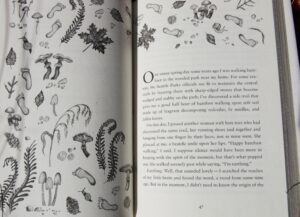 This nature manifesto is an invitation for readers to deepen their connection with nature and reexamine the way we think about the earth. Written in a series of themed chapters with simple, charming black-and-white illustrations, the author shares experiences that shaped her own relationship with nature. Drawing on science, philosophy, and folklore, she explains with urgency and grace why the world is in dire need of deconstructing and reimaging the way we are rooted in nature. She ends each chapter with a final thought, such as “decommodify the forest” or “sometimes go alone.”
This nature manifesto is an invitation for readers to deepen their connection with nature and reexamine the way we think about the earth. Written in a series of themed chapters with simple, charming black-and-white illustrations, the author shares experiences that shaped her own relationship with nature. Drawing on science, philosophy, and folklore, she explains with urgency and grace why the world is in dire need of deconstructing and reimaging the way we are rooted in nature. She ends each chapter with a final thought, such as “decommodify the forest” or “sometimes go alone.”
Raised Catholic, Lyanda uses religion as an avenue by which to imagine a mystical, wild world. As a young child, she loved attending church as equally as what she calls, her “Frog Church” a stream behind her house that served as a dwelling for tadpoles and frogs. With every chapter, she connects the discussion to a bigger picture and offers readers tools to rebuild their own relationship with the earth. Despite not being a religious person, I love how she draws on this essence of spirituality and the way she suggests that you can practice it in church or by silently catching frogs and considering how they wander between worlds from egg to tadpole, to froglet, and finally frog.
In this era of doom and gloom, where we are warned how close we are to the brink of destruction (if not already heading over the cliff), Lyanda offers answers in the spirit of Mary Oliver.

“No single human can work to save the orcas and protect the Amazon and organize anti-fracking protests and write poetry that inspires others to act and pray in a hermit’s dwelling for transformation and get dinner on the table. How easy it is to feel paralyzed by obligations. How easy it is to feel lost and insignificant and unable to know what is best, to feel adrift while yearning for purpose.”
The way forward, according to Lyanda is to deepen your rootedness, to be “in concert with the wilderness – and wildness – that sustains humans and all of life.” She notes the origins of practices like mindfulness and how psychologists are studying its effects. However, with this enchantment, the author manages not to live up to stereotypical ideas we have of nature lovers who do things like dance under the moon. While practices like wandering through nature play an important role, she reassures readers that it doesn’t need to be “dopey” or monk-like. She insists each person make it their own, whatever feels right, whether that is singing, being silent, or waving their arms around like an octopus. Your time with wilderness can be ten minutes or a day.
Diving into concepts like forest bathing, its indigenous cultural origins, and how it has been proven to improve human health, she challenges the reader:
“…Guided forest baths can inspire wonder and love. Yet we must remain alert to the ways we engage these sciences. The line between commodity and reciprocity may seen thin, but it is profoundly meaningful.”
She elaborates that this science is used to harness nature healing through methods like extracting the smell of trees, and showing videos of nature scenes to reduce stress in prisoners in solitary confinement. But, as she reiterates, there’s no replacement for the real thing.
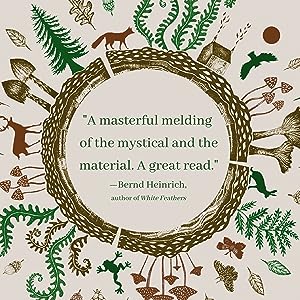
Rather than thinking about what wilderness can do for us, she suggests instead to think, “How should I live?” Additionally, it’s not all, inner peace, holistic health, and mindfulness. She notes that it’s important to take in the complexity of the wild, like the rattlesnakes who don’t want to bite humans any more than humans want to be bitten. Nature is beyond us, we are just a small part. We can’t commodify the forest, we can only exist in its space.
Though I did love every page of Rooted, I think it’s important to take a step back and observe that a lot of her work comes from a place of privilege. Though indigenous tribes and people of color have played a large role in conservation work, it rarely is highlighted as much as the work of environmental justice by white people. The conservation world is very often a white community. Not everyone has access to wilderness, green space, or educational institutions that offer a path to this knowledge. Why not the experience of prisoners in solitary confinement without offering insights from experts on how to perhaps, use nature to disrupt the prison industrial complex and rehabilitate former incarcerated people? Though it seems that Lyanda is trying to break down this knowledge that experts often gatekeep, after citing the indigenous folktales and cultural history behind humans’ rootedness in nature, there seems to be a lack of connection to this in the present day. Academics and scientists are not the only ones doing the work to re-imagine the way we relate to the earth. Connecting this to the way we can advocate and demand more of our policymakers and politicians would deepen her argument further. At times, it feels as though she’s trying to simplify the idea that we can help conservationists just by improving our relationship with nature. Finding a way to make these many complex paths meet would make this book a complete and even more extraordinary story.
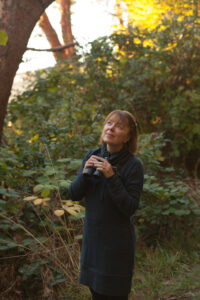
Lyanda Lynn Haupt with binoculars (credit: Tom Furtwangler)
LYANDA LYNN HAUPT is an award-winning author, naturalist, ecophilosopher, and speaker whose work explores the beautiful, complicated connections between humans and the wild, natural world.. Her newest book is Rooted: Life at the Crossroads of Science, Nature, and Spirit (Little, Brown Spark 2021).
Lyanda’s writing is acclaimed for combining scientific knowledge with literary, poetic prose. Her previous books include Mozart’s Starling, The Urban Bestiary: Encountering the Everyday Wild, Crow Planet: Essential Wisdom from the Urban Wilderness, Pilgrim on the Great Bird Continent: The Importance of Everything and Other Lessons from Darwin’s Lost Notebooks, and Rare Encounters with Ordinary Birds. She is a winner of the Sigurd Olson Nature Writing Award, the Nautilus Book Award, a finalist for the Orion Book Award, and a two-time winner of the Washington State Book Award.
Lyanda has created and directed educational programs for Seattle Audubon, worked in raptor rehabilitation in Vermont, and been a seabird researcher for the U.S. Fish and Wildlife Service in the remote tropical Pacific. Her essays have appeared in a variety of publications, including Orion, Discover, Utne, LA Times, Times Literary Supplement, Image, Huffington Post, Wild Earth, and Conservation Biology Journal. She lives in Seattle with her husband and a mixed backyard chicken flock.
Follow Lyanda on Instagram, or Lyanda’s blog, and subscribe to her newsletter, Wander.


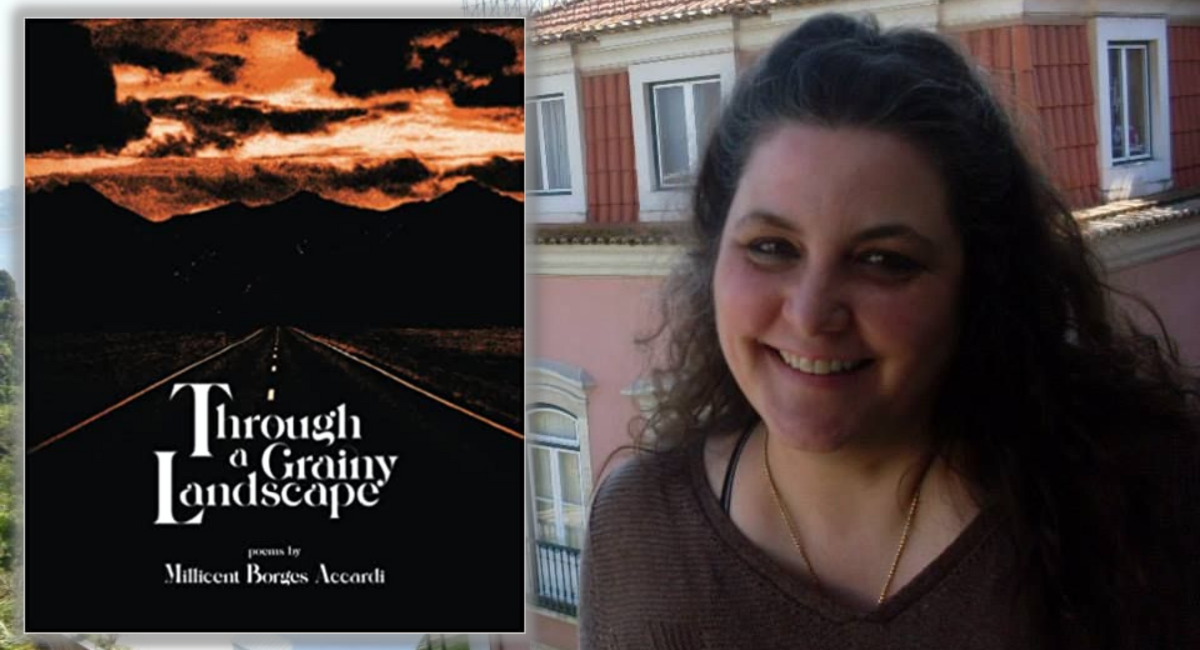
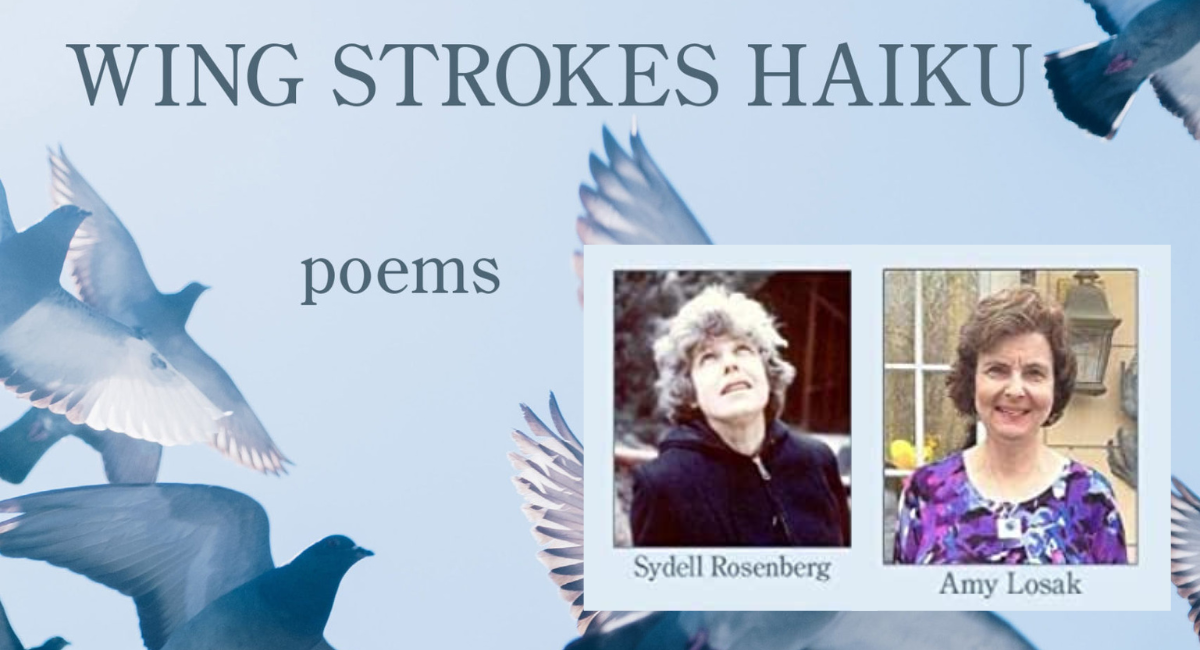

0 Comments